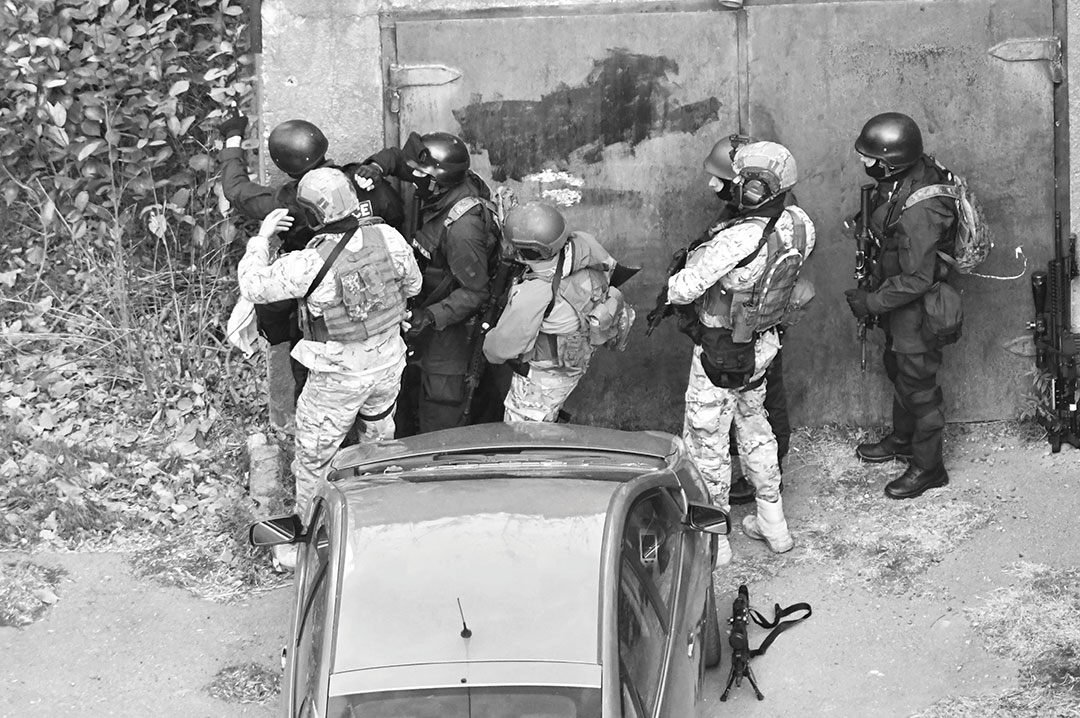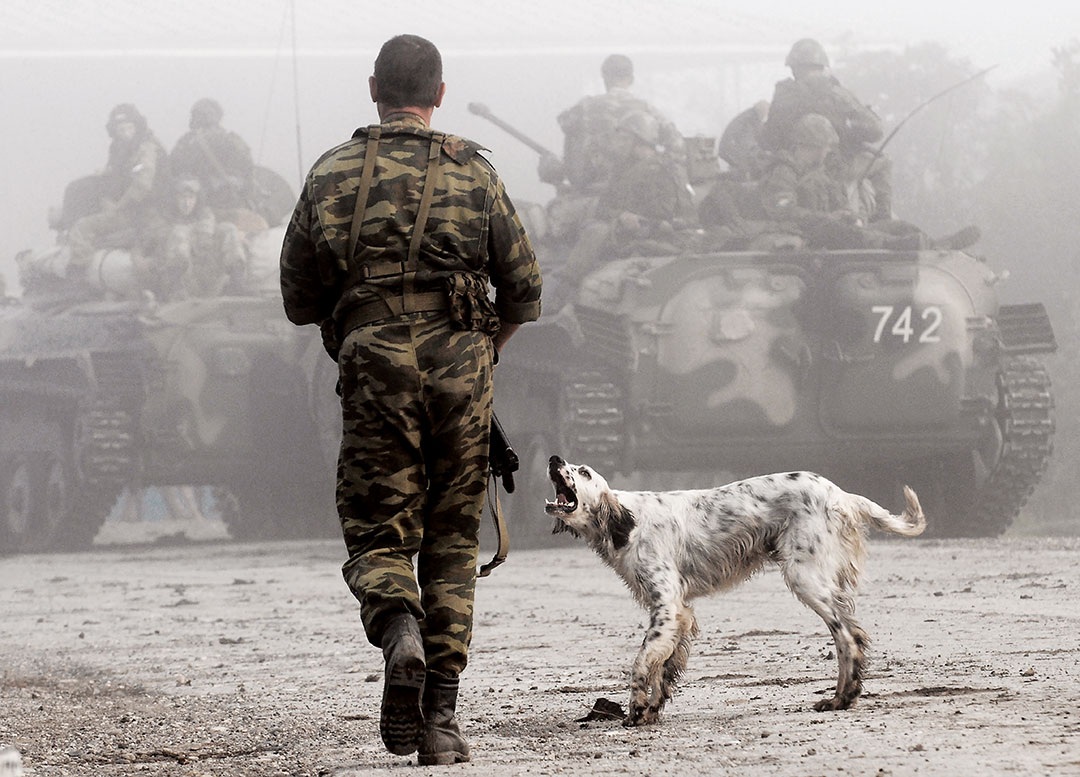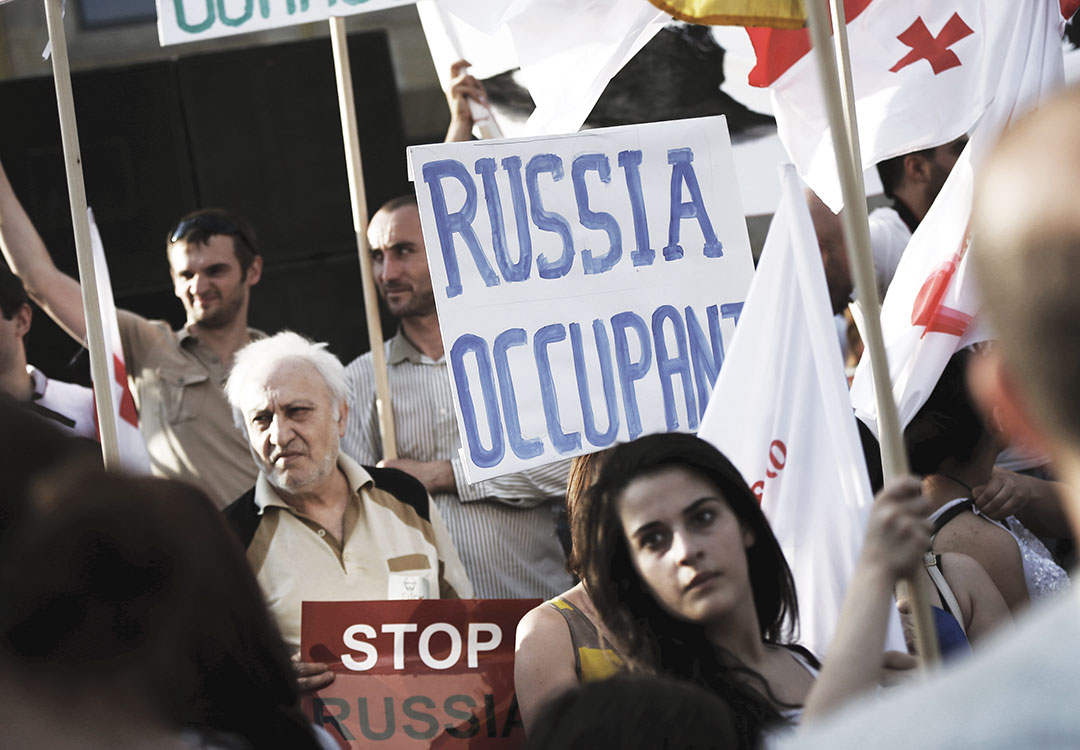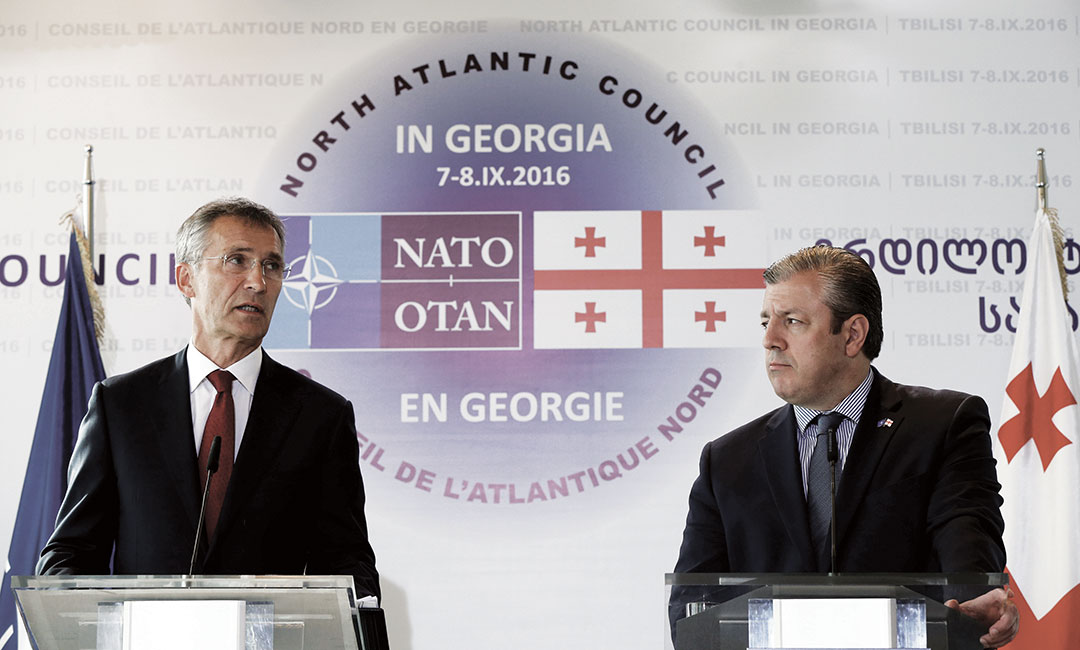Georgia needs institutional resilience in its national security decision-making
By Tamar Bazgadze
The term “hybrid warfare” has become a cryptic buzzword in the Euro-Atlantic security community. Yet its analytical-added value lies in its usefulness in achieving conceptual clarity regarding the complex security environment and in refining national security decision-making.
The term emerged in the context of Hezbollah’s fight against Israel, where it exemplified how a nonstate actor could use a tool kit of conventional and unconventional means to face off against a modern state. Hybrid warfare, in defense analyst Frank Hoffman’s words, constitutes a “blend of the lethality of state conflict with the fanatical and protracted fervor of irregular war.” However, the term achieved mainstream usage after Russia annexed the Crimean Peninsula and initiated an offensive in eastern Ukraine, where the Hezbollah-Israel paradigm was turned on its head. Russia, a powerful nuclear-armed state, used hybrid tactics against a sovereign country and in the process shook the foundations of the European security architecture to its core.

The concept behind the term hybrid warfare seems to lack underlying consensus due to an atomization of the conceptual framework and a failure to embrace strategic linkages within holistic phenomenon serving a strategic end state. The modus operandi of a hybrid offensive incorporates a wide range of overt and covert military, paramilitary and nonmilitary means that are employed in a highly integrated way while staying below the threshold of formally declared warfare. By blurring the lines between war and peace and eroding casus belli, these nonlinear attacks target vulnerabilities to destabilize states, distort situational awareness and create ambiguity to hinder decision-making. Targeting decision-making processes is a major aspect of hybrid warfare. Igniting contradictions, ambiguities and uncertainties can buy time to establish facts on the ground and gain strategic advantage long before the opponent can identify and categorize a threat.
Interfering with an opponent’s decision-making process was integral to Russian military thinking well before the hybrid war era. It was embedded in the Soviet’s reflexive control theory, which can be used against either human- or computer-based decision-making processes. Reflexive control is about influencing the decisions of an opponent by shaping its perceptions. Perception is an active process, which constructs rather than records reality. Soviet military scholar Vladimir Lefebvre, who developed the reflexive control theory, put it this way:
“In making his decision the adversary uses information about the area of conflict, about his own troops and ours, about their ability to fight, etc. We can influence his channels of information and send messages which shift the flow of information in a way favorable for us. The adversary uses the most contemporary method of optimization and finds the optimal decision. However, it will not be a true optimum, but a decision predetermined by us. In order to make our own effective decision, we should know how to deduce the adversary’s decision based on information he believes is true. The unit modeling the adversary serves the purpose of simulating his decisions under different conditions and choosing the most effective informational influence.”

Russian hybrid warfare, incorporating reflexive control measures, creates plausible deniability intended to neutralize the opponent’s operational thinking. This brings up the central question: How does a state think and how does it institutionalize the process of thinking? When the decision-making process is targeted, how does the state secure its strategic function? Cultural, structural and normative impediments in Georgia’s national security decision-making expose how internal institutional dysfunction can be the biggest threat to the country’s hybrid defense.
Russia’s hybrid offensive
Georgia was targeted by a Russian hybrid offensive before the term “hybrid” entered academic and policy debate. After the Soviet Union came apart in 1991, Moscow started to experience phantom pains for its lost empire, with Russian President Vladimir Putin later declaring that the Soviet Union’s dissolution was “the greatest geopolitical catastrophe of the 20th century.”
An up-close-and-personal look at Russia’s historical and cultural fabric exposes the internal drivers of Russian foreign policy offensives in the post-Soviet space and beyond. The linkages between internal drivers and their external projection play out in Moscow’s quest for spheres of influence. Russia’s internal vulnerability, caused by its historical evolution, its model of governance and the internal contradictions of its systemic legitimacy, leads to the securitization of its identity and sets imperatives and constraints on Russia’s foreign policy options. Russia’s strategic culture pushes for expansion in order to prevent internal implosion. It partially reflects the fear that the successful transition of its former satellite republics into prosperous, pluralistic, democratic polities might stir demands for similar transformation inside Russia.
To reassert its status as a great power with global reach, Russia needs to secure its buffer zone, infamously declared a “sphere of privileged interests” by former President Dmitry Medvedev in 2008. To do so, since 1991 Russia has been leveraging multiple pressure points to exercise negative control on the foreign and security policies of the countries falling under that umbrella.
Among those critical pressure points are the so-called frozen conflicts — Abkhazia (Georgia), the Tskhinvali Region (also called South Ossetia, Georgia), Nagorno-Karabakh (Armenia and Azerbaijan), Transnistria (Moldova) and most recently Donbas (Ukraine) — which have been stoked and modulated by Moscow using proxy forces. These conflicts are not frozen; however, their peace processes are. Continuing to use the term “frozen” creates a false sense of stability and security when the reality is that unresolved differences and protracted tensions are fueling animosities, entrenching and strengthening hostile narratives, and pushing confrontational policies, making these conflicts easily susceptible to flare-ups. The situation on the ground is aggravated by the complete lack of international arms control and security mechanisms (the Conventional Armed Forces in Europe Treaty is practically useless). That leads to the militarization of the region and grants Russia escalation control.

Along with these protracted conflicts, Russia has used a wide spectrum of economic, political, energy, social and informational pressure points in Georgia to facilitate the collapse of critical state institutions and functions needed to successfully transition from a totalitarian to a democratic state. In sum, Russia has been targeting Georgia’s independent development as a sovereign state and the way of life it chose to pursue. To halt Georgia’s strategic rapprochement with the West and its integration into the trans-Atlantic security community, the Kremlin orchestrated a full-scale military invasion in August 2008, defying international law and the European security order.
The war, as part of Russia’s “salami-slicing” strategy, didn’t start in 2008 and it didn’t end there. To secure and advance its gains, Russia started to employ multidimensional hybrid tactics — measures short of war — including the recognition and militarization of Georgia’s breakaway regions, setting in motion a process of creeping occupation, using what some analysts inaccurately refer to as soft power tools. “Soft power is,” as defined by the political scientist Joseph Nye, “the ability to get what you want through attraction and persuasion rather than threats and coercion.” Real soft power rests in culture, political values and foreign policies seen as legitimate and carrying moral authority. In Russia’s case, information warfare and narrative culture are used offensively to discredit Western values and to undermine the credibility of liberal democracy and Western institutions without putting forward any viable alternative model of development.
Addressing hybrid threats
The Georgian Strategic Defence Review 2017-2020 acknowledged hybrid warfare as a threat to Georgia’s sovereignty and national security, though there are no “silver bullet” strategies, or purely military, diplomatic or economic solutions to this threat. For starters, it is critical to consider how we think about sustainable security, and whether existing models and approaches are relevant for the complex security environment. The broadening of the concept of security now entails a qualitatively different, comprehensive approach to security policy that integrates all the instruments of national power. The philosophy of comprehensive security was adopted by Georgia and incorporated in SDR 2017-2020 as a “total defense” approach to defense policy. Total defense — requiring total commitment to security — should rest upon the coherent and efficient interaction of all security stakeholders (military and civilian), on different levels, ensured by a carefully designed national security policy process. Yet, in Georgia’s case the execution of a comprehensive security approach might be hindered by a lack of systemic infrastructure for decision-making.
With the constitutional changes adopted in 2010, Georgia shifted from a presidential to a parliamentary model of governance. Constitutional amendments and ensuing structural reforms significantly affected Georgia’s security sector, its organizational setup and its strategic decision-making pattern. Today, the government takes the lead with considerably increased authority in national security. Even though the mandate to conduct foreign and security policy has transferred from the president to the prime minister, the president remains the head of state and commander in chief of the Armed Forces, as well as the guarantor of the country’s territorial integrity and national independence.

Executive roles in national security come with strategic functions and a system of decision-formulation and implementation. Strategic functions are based on how a state defines national interests, understands notions of security and defense, and how it secures their adequate and efficient execution. Initially, according to the Constitution, the National Security Council (NSC), under the president, served as the main advisory body in security policy formulation. After responsibility transferred to the prime minister, the State Security and Crisis Management Council (SSCMC) was set up to provide the chief executive with a national security decision-support system. Cohabitation of the two security councils in adapting to a dynamic security context sparked a harsh debate about the efficiency of national security decision-making. But according to the new round of constitutional amendments and structural reforms initiated in 2017, both councils as we know them will cease to exist. The SSCMC has already been succeeded by an emergency management center that is tasked to perform operational and tactical functions only. The NSC will be replaced by the National Defence Council, which will function only during war and will be chaired by the president. The emerging status quo for strategic-level policy and decision-making leaves the comprehensive approach to national security in Georgia hanging in the balance.
Policymakers often refer to institution building as the main policy approach to security sector reform, which is not a one-off act, but rather a complex adaptive process. And institution building is more than simply organization building; establishing new entities without the means and capacity to generate institutional memory, can lead to pseudomorphism and institutional mutation. If there is no mechanism to provide vertical coherence between macro and micro policy levels, and changes are attempted locally without taking into consideration the global systemic context, reform efforts are doomed to fail.
Georgia’s National Defence Council could fall into this trap. Within the ambiguity of hybrid warfare, deciding what constitutes an act of war can be a complex political decision, and it is still not clear, in a situation approaching that threshold, how accurate informational and analytical support will be provided for the decision-making process, especially considering that modern democratic practice requires institutional checks and balances on decision-making. To partially address the structural vacuum, a permanent interagency commission on state defense policy planning, chaired by the minister of defence, was set up to discuss national-level defense policy concepts, submit national defense readiness plans to the government, and ensure the coordination of national defense policy planning and implementation. Though the commission is not authorized to carry out the national security review process, which is a key function defined by the National Security Concept of Georgia.
The lack of a complex, adaptive security system, with a systemic approach to decision-making and a supreme interagency coordination body at the highest political level, manifests itself in a grand strategic deficit and could leave Georgia in a perpetual state of reactive policymaking, only fighting the symptoms of hybrid warfare locally. Georgia unequivocally needs an effective security and development strategy. But strategies are shaped by the processes that produce them. A product-oriented culture of national security, ignoring the importance of the process, risks devitalizing national-level strategic and conceptual document development practices. Eventually, sectoral strategies might emerge without an overarching strategic umbrella and checks and balances, diminishing the self-confidence of the entire security sector.
Institutional resilience
Political will is fundamental to promote self-confidence in Georgia’s governance system. Systemic security sector transformation should ensure the adaptive capacity of the state. Adaptive capacity is shaped by institutions; therefore, building institutional resilience into the national security policy process is fundamental to the complete whole-of-government cycle from awareness to recovery. Resilience is a system’s capacity to withstand stress and recover. Therefore, Georgia needs to design a holistic system that would actuate interagency, cabinet-level planning and oversight toward creating early warning, strategic assessment, strategy making, crisis response and policy development mechanisms — in other words, to create a complex adaptive security system designed to cope with the interconnectedness and complexity of a fast-paced hybrid threat environment. This is how a state can institutionalize a culture of strategic thinking in a national security decision-making process.

To bring this vision to life, Georgia needs to identify the conditions at the national, governmental, agency and individual levels that are required for successful interaction among security stakeholders from basic consultations to advanced collaboration. Those interactions are the keystone of whole-of-government and whole-of-society approaches. Implementing them requires shifts in governance culture and institutional structures, in interagency processes and practices, and in leadership styles and individual skills. Fundamental steps for Georgia may be as follows:
Promoting an inclusive national conversation and shaping a strategic narrative on the conceptual and practical aspects of whole-of-government and whole-of-society approaches to security and defense, especially as Georgia is set to implement its Total Defense doctrine.
Strengthening the comprehensive strategic culture and, more specifically, building institutionally secured capacity for professional policymaking in Georgia’s political system. Thoughtful approaches for systemic transformation must be the starting point. It should be cultivated through local ownership, taking into consideration local context, and converting the findings into an intellectual foundation for institution building, rather than relying only on policy advice from abroad.
Establishing a structured and sustained system of multilevel, interagency policymaking, including coordination, cooperation and collaboration within the wider security and defense policy community, ensuring that strategic communications can be truly strategic. The system should ensure that the gap between the decision-makers and professionals is reduced, horizontal integration of efforts is stimulated and a bottom-up approach to policymaking is also enabled. These structures and processes should be underpinned by a normative base carrying the force of law and demanding adherence.
And very importantly, developing and strengthening the institutions that provide analytical support for top national security decision-makers. Their capacity to jointly perform round-the-clock multidisciplinary strategic analysis on internal vulnerabilities and external threats, develop strategic assessments and alternative policy recommendations should facilitate creation of a knowledge-based security system. Cultivating analytical and strategic planning capabilities will contribute to resilience in national security policymaking, and promote Georgia’s hybrid defense.


Comments are closed.